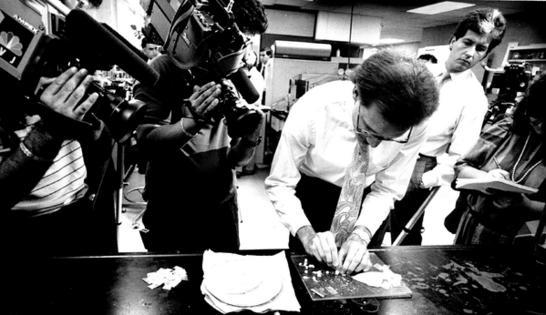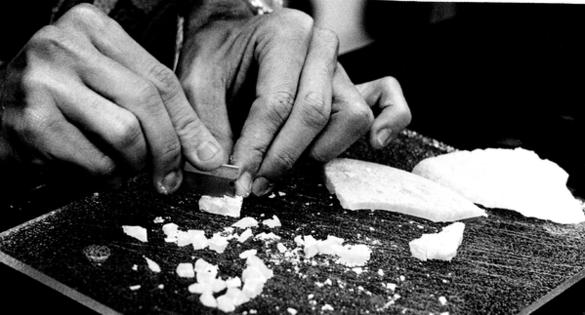Florida county is vacating convictions of those who bought crack made at courthouse
Published in News & Features
It was the height of the ‘80s crack cocaine epidemic, and the Broward County Sheriff’s Office was breaking the law to enforce it.
Law enforcement cooked crack cocaine on the seventh floor of the county courthouse. Deputies posed as drug dealers. And the people who purchased it were swiftly locked behind bars. Ultimately, the Florida Supreme Court ruled in 1993 that this practice was illegal. But for 30 years, the people wrongfully arrested, convicted and incarcerated because of these “reverse-sting operations” lived — and possibly died — with that mark on their records.
That ends now, Broward State Attorney Harold Pryor announced this month. His office will work to vacate the decades-old convictions of people arrested for purchasing BSO-manufactured crack cocaine — some of whom purchased the drugs within 1,000 feet of a school, an offense that carried a mandatory minimum three-year prison sentence.
“It is never too late to do the right thing,” Pryor said in a statement. “The methods used by law enforcement and society to combat drug dealing in our community have evolved since that era. These records may be a dim memory or an unfortunate part of history to many, but they have had a long-lasting and severe impact on the lives of the people who were arrested — as well as their families and the wider community.”
Thousands of victims
Broward prosecutors realized hundreds of individuals charged in those stings may still have convictions on their records “during a routine review of public documents” in the archives, the office said in a statement.
The process is expected to take “a considerable amount of time” as the Broward State Attorney’s Office estimates there may have been as many as 2,600 cases between the late 80s and early 90s. Staff has to sift through “old dusty paper files” from the archives to find people affected, spokesperson Paula McMahon wrote in an email.
“These matters were well before our tenures. However, I am of the opinion that the State has an ethical duty and obligation to correct this injustice before destruction (of old records) is initiated,” Pryor wrote in a letter to Sheriff Greg Tony about the project.
BSO’s brazen actions led to several lawsuits, including a case heard by the Florida Supreme Court: the State of Florida v. Leon Williams.
On Feb. 15, 1990, police arrested Williams for allegedly buying crack cocaine within 1,000 feet of a school. Williams, who was represented by attorney Ed Hoeg, filed a motion to dismiss the charges, alleging police misconduct.
According to court documents, two years earlier, a detective found 991.2 grams of powder cocaine in a Greyhound bus station locker and turned it over to the BSO Crime Lab. No arrests were made because of the discovery, so the drugs were supposed to be destroyed. Instead, the BSO Crime Lab kept the cocaine and got approval from Sheriff Nick Navarro to turn the powder in crack to use in reverse-sting operations, like the one that landed Williams behind bars.
Hoeg was pleasantly surprised to see Pryor’s announcement this month. So much time had passed, Hoeg said he hadn’t thought about those cases in years and has lost track of where Williams is today.
He did recall a different case that went to trial, though: A man approached an undercover deputy looking to buy marijuana, but the deputy told him all he had was crack. The man didn’t want crack, so he tried to leave on his bike. The deputy tackled him to the ground.
The drug busts were all for show, Hoeg told the Herald.
“[Navarro] would go out with television crews. He would alert the news so they would be with them when they did these reverse-stings. Eighty, ninety, 110 arrests a night at different locations. It was pretty crazy,” Hoeg said. “I said it once, but I’ll say it again. I don’t think they caught one dealer. They didn’t catch one trafficker. They caught users. They didn’t do anything about the crack problem with those operations.”
Raymond Hicks, a former BSO deputy, said he witnessed misconduct firsthand, including fellow deputies planting drugs on suspects in the ‘90s. The Sheriff’s Office’s methods were morally wrong, he said.
“I told them, ‘You guys are no different than the dealers we put in the paddy wagon. You guys should be going downtown yourself,’” he said. “They told me to mind my business.”
Hicks alleges that BSO colleagues retaliated against him by falsely framing him as a drug kingpin in 2000. He was acquitted after spending nearly two years in jail.
“I hope (the vacated records) brings some kind of closure to these people and their families,” Hicks said. “Their lives were destroyed. My life was destroyed. I can only imagine what they were going through.”
‘Never too late’
While civil rights groups and elected officials praised the state attorney for initiating this process, legal experts note that it may be too little too late for individuals who had their lives upended by illegal reverse-sting operations decades ago.
“It’s a good thing to try to undo the convictions,” Hoeg said. “But my question was what does that really do for the people if they’ve had 30 years of not getting the job they wanted, not getting the house that they wanted, not being able to vote for 30 years?”
The nationwide war on drugs in the ‘80s “literally destroyed communities,” said Tieffa Harper, the Southern Poverty Law Center deputy legal director for criminal legal system reform. Drug arrests impacted not just the individuals but their families and neighborhoods as well, she said.
“I’m celebrating this decision while lamenting that it took so long to do this,” Harper said.
Though powder cocaine and crack cocaine are essentially the same drug, sentences for possession or sale of crack were significantly steeper than criminal offenses related to powder, Harper said. Crack was prevalent in Black neighborhoods, while powder was prevalent in white neighborhoods.
“Yes, I agree that it’s never too late to do the right thing, but I think these cases highlight our country’s failed war on drugs and the intentional way in which we incarcerated and disproportionately impacted Black and brown communities for generations,” Harper said. “I think the cases also reveal and highlight our country’s history of aggressive and abusive policing which targets those same communities.”
Reverse-sting operations were commonplace across the country, but BSO’s scheme to cook crack cocaine “is at the top of the list of egregious reverse-sting operations that have happened,” Harper said. Hopefully, Broward’s efforts to right these wrongs will inspire more prosecutors to do the same, she said.
“A move like this, particularly from this office, does send a strong signal, and that’s why we welcome it,” she said. “The hope is that other offices will do something similar, review their old cases, acknowledge that the way we prosecuted people and incarcerated people was not the answer.”
_______
If you or a family member may have been affected, contact casereview@browardsao.com or call 954-831-6543.
_______
©2024 Miami Herald. Visit miamiherald.com. Distributed by Tribune Content Agency, LLC.










Comments